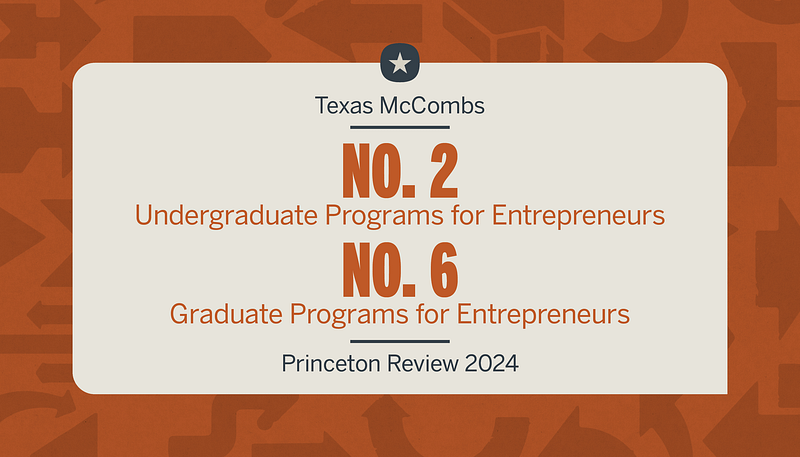McCombs Entrepreneurship Again Hits No. 2 in Princeton Review Rank
Undergraduate and graduate entrepreneurship both take high marks in the annual lists.

In Princeton Review’s tally of the top 50 U.S. undergraduate schools for entrepreneurship for 2024, the McCombs School of Business took the No. 2 spot in the nation for the second year in a row.
This marks the third year that the school has landed in the top 5 on the undergraduate side. The annual ranking is published in partnership with Entrepreneur magazine.
McComb’s Entrepreneurship Minor launched in Fall 2018 with fewer than 90 students, and has since expanded into a cross-campus collective of over 800 students from liberal and fine arts, communication, engineering, natural sciences, as well as business. The school has only participated in the survey on the undergrad side for the past five years.
Undergraduate entrepreneurship at McCombs includes the Kendra Scott Women’s Entrepreneurial Leadership Institute, The McCombs Global Sustainability Leadership Institute, and the McCombs Harkey Institute for Entrepreneurial Studies, which collects data from schools and colleges across the University of Texas at Austin campus for submission to this ranking program each year.
Graduate Entrepreneurship. No. 6
On the graduate side, McCombs landed at No. 6 in the 18th edition of the top 50 U.S. graduate schools for entrepreneurship.
This year marks the 11th time in 14 years that McCombs has made the top 10 among graduate programs in the annual ranking.
Graduate entrepreneurship at McCombs encompasses the Texas MSTC program and suite of Texas MBA programs, but holistically includes a host of initiatives and opportunities available to McCombs and UT students: the Herb Kelleher Entrepreneurship Center, Jon Brumley Texas Venture Labs, the Texas Venture Labs Investment Competition, the Venture Fellows program, and the Austin Technology Incubator.
Both surveys collect over 40 data points each from over 300 schools, measuring programmatic items, such as scholarships, mentorship programs, and business competitions, but also outcomes, such as the number of businesses launched, the funding they raised, and their survivorship after graduation.
About this Post
Share:


